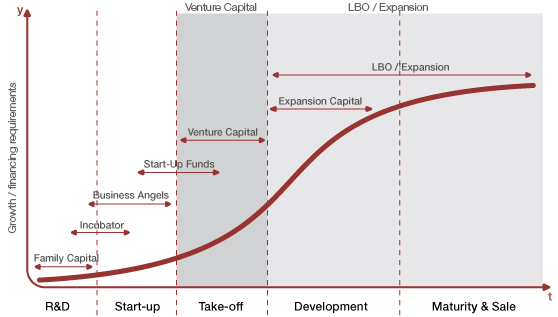A quick review of the Growth Capital…
In this article, Louis DETALLE (ESSEC Business School, Grande Ecole Program – Master in Management, 2020-2023) explains what is Growth Capital and what it consists in.
What does Growth Capital consist in?
Growth capital refers to the funding that a company receives in order to expand its operations, enter new markets, or develop new products and services. This type of financing is typically sought by companies that are already generating revenue and have a proven track record of success but need additional funds in order to take their business to the next level.
What are the main actors a company can resort to when it comes to Growth Capital?
What is interesting with growth capital is that it is all about companies that are halfway between Venture Capital and Private Equity.
For that matter, there are several sources of growth capital, including venture capital firms and private equity firms that invest at different times in the life of the company. Venture capital firms typically invest in early-stage companies that have high growth potential, but may not yet be profitable. Private equity firms, on the other hand, typically invest in more established companies that are looking to expand through acquisitions (see the notion of “build-up”) or other means. A company will choose its investor according to its stage of development, its sector, its objectives and the network of the investors that it will be able to benefit from.
What does an analyst in Growth Equity work on?
The tasks of a Growth Equity analyst are diverse but similar to those of Private Equity & Venture Capital. They include for example, the producing and challenging a business plan, modelling different scenarios and strategies in Excel. The analyst and the investment teams thoroughly analyze the companies seeking for funding and the environments they are trying to grow into. If a company A well anchored in France is willing to conquer a new market European market, the job will consist in assessing the German market and see if the product developed by company A will work efficiently in the next country or if it is more accurate to try and find a similar company that can be bought there!
In other words, an analyst in Growth Equity will try to determine whether the projections of the seeked investment are reasonable, not overestimated and feasible.
What is the life cycle of a company and where does growth capital intervene?
At the beginning, when the startup is only an idea, the founders talk to Business Angels and VC funds that invest very early (called “seed investors”) and therefore small tickets. However, VC can come at the very beginning, as “seed investors”, of later in core venture with “A-B and C series”. These series mean the different funding rounds of the company that is growing.
Later on, companies can resort to growth capital, which aims at entering the capital of a company that has reached a certain maturity and profitability. The funds collected will then be used for internal and external growth: respectively the development of the company’s offers in order to develop its activities or the acquisition of competitors.
For that matter, Growth Capital will be the bridge between Venture Capital and Private Equity. Indeed, companies will finally reach Private Equity funds interest who will keep investing much more money than the previous actors…
After being bought, the most powerful and resilient companies will reach the IPO which can be considered as the ultimate goal. However, as you may have seen, the IPO arrives very late in the life cycle of a company
Source: https://www.dlacalle.com/en/private-equity-and-cheap-money/
Related posts on the SimTrade blog
▶ Akshit GUPTA Growth Investment strategy
▶ Louis DETALLE A quick presentation of the Private Equity field…
▶ Marie POFF Film analysis: The Wolf of Wall Street
Resources
Youtube Video explaining the different cycles of companies: VC/Growth/Private Equity
The top 10 VC actors in France
About the author
The article was written in December 2022 by Louis DETALLE (ESSEC Business School, Grande Ecole Program – Master in Management, 2020-2023).



1 thought on “A quick review of the Growth Capital…”
Comments are closed.